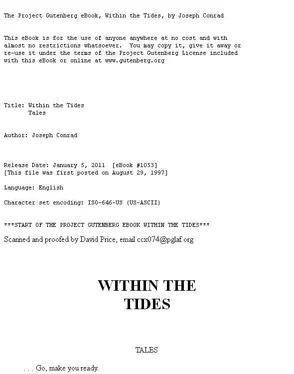He moved off a pace, then turning his head: “Upon my word! I would be infinitely obliged to you if you could throw a little cold water. . . ” and at a vaguely dismayed gesture of Renouard, he added: “Don’t be afraid. You wouldn’t be putting out a sacred fire.”
Renouard could hardly find words for a protest: “I assure you that I never talk with Miss Moorsom—on—on—that. And if you, her father . . . ”
“I envy you your innocence,” sighed the professor. “A father is only an everyday person. Flat. Stale. Moreover, my child would naturally mistrust me. We belong to the same set. Whereas you carry with you the prestige of the unknown. You have proved yourself to be a force.”
Thereupon the professor followed by Renouard joined the circle of all the inmates of the house assembled at the other end of the terrace about a tea-table; three white heads and that resplendent vision of woman’s glory, the sight of which had the power to flutter his heart like a reminder of the mortality of his frame.
He avoided the seat by the side of Miss Moorsom. The others were talking together languidly. Unnoticed he looked at that woman so marvellous that centuries seemed to lie between them. He was oppressed and overcome at the thought of what she could give to some man who really would be a force! What a glorious struggle with this amazon. What noble burden for the victorious strength.
Dear old Mrs. Dunster was dispensing tea, looking from time to time with interest towards Miss Moorsom. The aged statesman having eaten a raw tomato and drunk a glass of milk (a habit of his early farming days, long before politics, when, pioneer of wheat-growing, he demonstrated the possibility of raising crops on ground looking barren enough to discourage a magician), smoothed his white beard, and struck lightly Renouard’s knee with his big wrinkled hand.
“You had better come back to-night and dine with us quietly.”
He liked this young man, a pioneer, too, in more than one direction. Mrs. Dunster added: “Do. It will be very quiet. I don’t even know if Willie will be home for dinner.” Renouard murmured his thanks, and left the terrace to go on board the schooner. While lingering in the drawing-room doorway he heard the resonant voice of old Dunster uttering oracularly—
“. . . the leading man here some day. . . . Like me.”
Renouard let the thin summer portière of the doorway fall behind him. The voice of Professor Moorsom said—
“I am told that he has made an enemy of almost every man who had to work with him.”
“That’s nothing. He did his work. . . . Like me.”
“He never counted the cost they say. Not even of lives.”
Renouard understood that they were talking of him. Before he could move away, Mrs. Dunster struck in placidly—
“Don’t let yourself be shocked by the tales you may hear of him, my dear. Most of it is envy.”
Then he heard Miss Moorsom’s voice replying to the old lady—
“Oh! I am not easily deceived. I think I may say I have an instinct for truth.”
He hastened away from that house with his heart full of dread.
CHAPTER VI
On board the schooner, lying on the settee on his back with the knuckles of his hands pressed over his eyes, he made up his mind that he would not return to that house for dinner—that he would never go back there any more. He made up his mind some twenty times. The knowledge that he had only to go up on the quarter deck, utter quietly the words: “Man the windlass,” and that the schooner springing into life would run a hundred miles out to sea before sunrise, deceived his struggling will. Nothing easier! Yet, in the end, this young man, almost ill-famed for his ruthless daring, the inflexible leader of two tragically successful expeditions, shrank from that act of savage energy, and began, instead, to hunt for excuses.
No! It was not for him to run away like an incurable who cuts his throat. He finished dressing and looked at his own impassive face in the saloon mirror scornfully. While being pulled on shore in the gig, he remembered suddenly the wild beauty of a waterfall seen when hardly more than a boy, years ago, in Menado. There was a legend of a governor-general of the Dutch East Indies, on official tour, committing suicide on that spot by leaping into the chasm. It was supposed that a painful disease had made him weary of life. But was there ever a visitation like his own, at the same time binding one to life and so cruelly mortal!
The dinner was indeed quiet. Willie, given half an hour’s grace, failed to turn up, and his chair remained vacant by the side of Miss Moorsom. Renouard had the professor’s sister on his left, dressed in an expensive gown becoming her age. That maiden lady in her wonderful preservation reminded Renouard somehow of a wax flower under glass. There were no traces of the dust of life’s battles on her anywhere. She did not like him very much in the afternoons, in his white drill suit and planter’s hat, which seemed to her an unduly Bohemian costume for calling in a house where there were ladies. But in the evening, lithe and elegant in his dress clothes and with his pleasant, slightly veiled voice, he always made her conquest afresh. He might have been anybody distinguished—the son of a duke. Falling under that charm probably (and also because her brother had given her a hint), she attempted to open her heart to Renouard, who was watching with all the power of his soul her niece across the table. She spoke to him as frankly as though that miserable mortal envelope, emptied of everything but hopeless passion, were indeed the son of a duke.
Inattentive, he heard her only in snatches, till the final confidential burst: “. . . glad if you would express an opinion. Look at her, so charming, such a great favourite, so generally admired! It would be too sad. We all hoped she would make a brilliant marriage with somebody very rich and of high position, have a house in London and in the country, and entertain us all splendidly. She’s so eminently fitted for it. She has such hosts of distinguished friends! And then—this instead! . . . My heart really aches.”
Her well-bred if anxious whisper was covered by the voice of professor Moorsom discoursing subtly down the short length of the dinner table on the Impermanency of the Measurable to his venerable disciple. It might have been a chapter in a new and popular book of Moorsomian philosophy. Patriarchal and delighted, old Dunster leaned forward a little, his eyes shining youthfully, two spots of colour at the roots of his white beard; and Renouard, glancing at the senile excitement, recalled the words heard on those subtle lips, adopted their scorn for his own, saw their truth before this man ready to be amused by the side of the grave. Yes! Intellectual debauchery in the froth of existence! Froth and fraud!
On the same side of the table Miss Moorsom never once looked towards her father, all her grace as if frozen, her red lips compressed, the faintest rosiness under her dazzling complexion, her black eyes burning motionless, and the very coppery gleams of light lying still on the waves and undulation of her hair. Renouard fancied himself overturning the table, smashing crystal and china, treading fruit and flowers under foot, seizing her in his arms, carrying her off in a tumult of shrieks from all these people, a silent frightened mortal, into some profound retreat as in the age of Cavern men. Suddenly everybody got up, and he hastened to rise too, finding himself out of breath and quite unsteady on his feet.
On the terrace the philosopher, after lighting a cigar, slipped his hand condescendingly under his “dear young friend’s” arm. Renouard regarded him now with the profoundest mistrust. But the great man seemed really to have a liking for his young friend—one of those mysterious sympathies, disregarding the differences of age and position, which in this case might have been explained by the failure of philosophy to meet a very real worry of a practical kind.
Читать дальше












